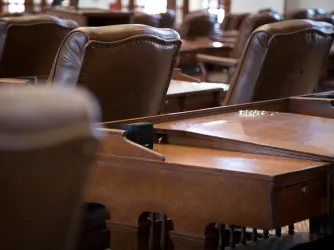Table of Contents
Bad moon rising? The Insurrection Act in times of a regime of revenge — First Amendment News 403

First Amendment News is a weekly blog and newsletter about free expression issues by Ronald K. L. Collins. It is editorially independent from FIRE.
I see the bad moon a-risin'
I see trouble on the way.
When one pauses to consider the state of affairs in the world and the Republic, it’s hard to be an optimist. With ever-increasing frequency, so many fiddle while Rome seems to burn. Yet others are busy stoking the flames for today's and tomorrow’s political firestorms. In the process, hyperbole and hypocrisy are tapped to justify the worst of evils. Meanwhile, the specter of tyranny hovers like a weaponized drone ready for a command strike.
However interpreted, the First Amendment is antithetical to a regime of revenge. The very idea of government officials abusing their political power to persecute and prosecute their political adversaries smacks of tyranny — the same tyranny of John Adams and his administration in their Sedition Act crusade to silence and jail their Jeffersonian rivals.
Reminiscent of that, when Trump was on the losing side of the election, he boldly endorsed the “termination of all rules, regulations, and articles, even those found in the Constitution.”
Energized by authoritarian impulses reflected in increasingly unapologetic anti-democratic language, the former president delights in saying to his all-too-supportive fans, “I am your vengeance.”
As Charlie Savage, Jonathan Swan, and Maggie Haberman have reported:
In recent weeks, he has dehumanized his adversaries as ‘vermin’ who must be ‘rooted out.’ . . . More than anything else, Mr. Trump’s vow to use the Justice Department to wreak vengeance against his adversaries is a naked challenge to democratic values. Building on how he tried to get prosecutors to go after his enemies while in office.
Applying the law with political vengeance
“No man or woman should be able to unilaterally deploy the armed forces to control America’s streets.” — David French
One way to ominously expand his executive powers to attack his political enemies would be for Trump to invoke the Insurrection Act and apply it with a vengeance.
Section 252 of that law gives the president the power to call out the National Guard or the regular army “whenever the president considers that unlawful obstructions, combinations, or assemblages, or rebellion against the authority of the United States, make it impracticable to enforce the laws of the United States in any state by the ordinary course of judicial proceedings” (emphasis added).

Furthermore, Section 253 empowers the president to “take such measures he considers necessary” to suppress “any insurrection, domestic violence, unlawful combination or conspiracy” (emphasis added). As David French pointed out in an eye-opening column in The New York Times: “This broad grant of power makes the Insurrection Act far more immediately dangerous than many other threatened Trump actions, such as prosecuting political opponents and transforming the federal workforce.”
French has added that there “have been reports that Trump might invoke the act on the first day of his next term to suppress demonstrations.”
Checks on abuse of executive power?
The central problem with the Insurrection Act is an old one that traces back to the revolutionary spirit that railed against King George III’s abuses of power. As professor William Banks aptly pointed out:
It is well known that the American Revolution was spurred in large part by the colonists’ reaction to King George’s use of the military to enforce English laws in the colonies. After the colonists had become sufficiently disgruntled by the increasingly martial measures imposed by the King, the drafters of the Declaration of Independence listed among its central complaints the tendencies of the English Crown “to render the Military independent of and superior to the Civil Power.”

Mindful of that, professor Banks has stressed that “the Insurrection Act should be repaired to cure its constitutional defect and to better describe the triggering mechanisms and processes for involving federal military forces in a domestic incident.” (By the way: This article provides a valuable historical account surrounding the framing of the Insurrection Act with careful attention given to the constitutional and statutory mechanisms that permit a federal domestic military role.)
To much the same end, and in an informative 2021 law review comment article calling on Congress to reform the Insurrection Act, Jeremy Campbell noted:
Congress and the Supreme Court have failed to provide adequate checks on the president’s domestic military power, to determine the source of this power, and to accurately describe the limits of the president’s power under the Act. By failing to adhere to the conception of military involvement in domestic law enforcement that the Founders envisioned, the nation is left vulnerable to serious abuses of power for the sake of expediency.
Additionally, Campbell urged that:
Sections 252 and 253 of the Insurrection Act should be amended to require additional checks and a method for obtaining independent approval for the mobilization of armed forces within the United States. The power to use federal troops within a state, against the state’s will, should not be conditioned upon the discretion of a single individual.
Despite such calls for restraint and reform, if Mr. Trump is re-elected, a bad moon may soon be upon us.
Related
- Elizabeth Goitein and Joseph Nunn, “Brennan Center for Justice proposal to narrow the reach of the Insurrection Act,” (Sept. 20, 2022)
- Libby Cathey, “What Is the Insurrection Act and Why Has It Been Invoked Before?” ABC (June 2, 2020)
- Josh Blackman and Seth Barrett Tillman, “What Happens If the Biden Administration Prosecutes and Convicts Donald Trump of Violating 18 U.S.C. S 2383?” Illinois Law Review (April 30, 2021)
Trump stories
- “Judge Rejects Trump’s Claim of Immunity in His Federal 2020 Election Prosecution,” First Amendment Watch (Dec. 4)
Donald Trump is not immune from prosecution in his election interference case in Washington, a federal judge ruled Friday, knocking down the Republican’s bid to derail the case charging him with plotting to overturn the 2020 presidential election.
U.S. District Judge Tanya Chutkan’s decision amounts to a sharp rejection to challenges the Trump defense team had raised to the four-count indictment in advance of a trial expected to center on the Republican’s multi-pronged efforts to undo the election won by Democrat Joe Biden.
Though the judge turned aside Trump’s expansive view of presidential power, the order might not be the final say in the legal fight. Lawyers for Trump, who has denied any wrongdoing, are expected to quickly appeal to fight what they say an unsettled legal question.
In her ruling, Chutkan said the office of the president “does not confer a lifelong ‘get-out-of-jail-free’ pass.”
“Former Presidents enjoy no special conditions on their federal criminal liability,” Chutkan wrote. “Defendant may be subject to federal investigation, indictment, prosecution, conviction, and punishment for any criminal acts undertaken while in office.”
Chutkan also rejected Trump’s claims that the indictment violates the former president’s free speech rights. Lawyers for Trump had argued that he was within his First Amendment rights to challenge the outcome of the election and to allege that it had been tainted by fraud, and they accused prosecutors of attempting to criminalize political speech and political advocacy.
But Chutkan said “it is well established that the First Amendment does not protect speech that is used as an instrument of a crime.”
- “Lawsuits Against Trump Over the Jan. 6 Riot Can Move Forward, an Appeals Court Rules,” First Amendment Watch (Dec. 4)
Lawsuits against Donald Trump over the U.S. Capitol riot can move forward, a federal appeals court ruled on Friday, rejecting the former president’s bid to dismiss the cases accusing him of inciting the violent mob on Jan. 6, 2021.
The U.S. Court of Appeals for the D.C. Circuit court knocked down Trump’s sweeping claims that presidential immunity shields him from liability in the lawsuits brought by Democratic lawmakers and police officers. But the three-judge panel said the 2024 Republican presidential primary frontrunner can continue to fight, as the cases proceed, to try to prove that his actions were taken in his official capacity as president.
Trump has said he can’t be sued over the riot that left dozens of police officers injured, arguing that his words during a rally before the storming of the Capitol addressed “matters of public concern” and fall within the scope of absolute presidential immunity.
The decision comes as Trump’s lawyers are arguing he is also immune from prosecution in the separate criminal case brought by special counsel Jack Smith that accuses Trump of illegally plotting to overturn his election loss to President Joe Biden. Smith’s team has signaled that it will make the case at trial that Trump is responsible for the violence at the Capitol and point to Trump’s continued embrace of the Jan. 6 rioters on the campaign trail to argue that he intended for the chaos that day.
Friday’s ruling underscores the challenges facing Trump as he tries to persuade courts, and potentially juries, that the actions he took in the run-up to the riot were part of his official duties as president. The judge presiding over his election subversion criminal trial, Tanya Chutkan, also rejected that claim in an order released Friday night.
Related
- “Trump Attorney Says Trial During Presidential Campaign Would Be ‘Election Interference’,” First Amendment Watch (Dec. 4)
Georgia city apologizes to veteran arrested for holding ‘God Bless the Homeless Vets’ sign outside city hall
- “Georgia city forced to apologize to veteran arrested for holding ‘God Bless the Homeless Vets’ sign outside city hall,” FIRE (Nov. 21)

A Georgia city apologized and paid up to settle a lawsuit about its officer’s arrest of a veteran for holding a sign that said “God Bless the Homeless Vets” outside of its city hall.
Following a First Amendment lawsuit from the Foundation for Individual Rights and Expression and the University of Georgia Law School’s First Amendment Clinic, the City of Port Wentworth, Georgia, agreed to a settlement with Jeff Gray. As part of the settlement, the city agreed to donate a symbolic $1,791 to the National Coalition for Homeless Veterans —a nod to the First Amendment’s ratification in 1791 — and will give $1,791 each to Gray and FIRE. Port Wentworth will also maintain the public space in front of city hall as an open public forum and train its officers on citizens’ First Amendment rights.
“Port Wentworth found out the hard way that it can’t try to bulldoze my rights and get away with it,” said Gray, who regularly examines whether government officials know and respect citizens’ First Amendment rights. “I’m thankful for the outcome here, but I won’t stop speaking out on behalf of myself and my fellow citizens.”
Iowa high court upholds hate crime conviction
- Steve Karnowski, “Iowa high court affirms hate-crime conviction of man who left anti-gay notes at homes with rainbow flags,” Free Speech Center (Dec. 5)
The Iowa Supreme Court affirmed the hate-crime conviction Dec. 1 of a man who posted hand-written notes at homes with rainbow flags and emblems, urging them to “burn that gay flag.”
The majority rejected the claim by Robert Clark Geddes that his conviction for trespassing as a hate crime violated his free-speech rights. But a dissenting justice said a hate-crime conviction wasn’t appropriate since it wasn’t clear if the people displaying the symbols were actually associated with the LGBTQ+ community.
[ . . . ]
The individuals’ display of the LGBTQ+ flag or flag decal on their own properties was an exercise of First Amendment rights; the defendant’s surreptitious entry onto those properties to post his harassing notes was not,” the court said. Handwritten notes turned up in June of 2021 taped to the front doors of five renters and homeowners in the town of Boone who displayed rainbow flags or decals. All said, “burn that gay flag.” One contained additional anti-gay slurs. The recipients told police they found the notes “alarming, annoying, and/or threatening,” according to the decision.
[ . . . ]
In his dissent, Justice Matthew McDermott said there was no evidence in the record that the recipients of Geddes’ notes were members of the LGBTQ+ community or whether he believed they were, nor whether any of the residents had an ‘association with’ an actual person in those protected classes. He noted that the Legislature chose the words “association with” rather than “solidarity with” when it wrote the hate-crime law. “As a symbol, a flag doesn’t independently create or express actual association with particular persons” McDermott wrote, adding that, “Not everyone who displays a pirate flag is associated with actual pirates.”
- The case: Iowa v. Geddes (Iowa S. Ct., Dec. 1)
Turning Texas bookstores into censors

- Joshua House, “Texas law turns booksellers into censors,” FIRE (Dec. 1)
“READER Act” forces booksellers to blacklist books based on vague standards. FIRE is asking the Fifth Circuit to put a stop to it.
This year Texas passed the Restricting Explicit and Adult-Designated Educational Resources Act. The READER Act requires booksellers who sell books to school libraries to rate every book they sell as “sexually relevant,” “sexually explicit,” or “no rating.” It further bans all sales of “sexually explicit” materials to public schools.
So how do booksellers know how to rate each book in their libraries? Easy. Booksellers just have to follow these quick steps:
- Materials are rated “sexually relevant” if they contain any mention or depiction of sexual conduct.
- But sexually relevant material is “sexually explicit” if it is also patently offensive.
- Material is patently offensive if it is “so offensive on its face as to affront current community standards of decency.”
- Whether material affronts those “community standards of decency” depends on a “contextual analysis” consisting of multiple factors, including: “(1) the explicitness or graphic nature of a description or depiction of sexual conduct contained in the material; (2) whether the material consists predominantly of or contains multiple repetitions of depictions of sexual or excretory organs or activities; and (3) whether a reasonable person would find that the material intentionally panders to, titillates, or shocks the reader.”
- Of course, a single factor is not conclusive. Each factor must be “weigh[ed] and balance[d],” taking into account “the full context in which the description, depiction, or portrayal of sexual conduct appears, to the extent possible, recognizing that contextual determinations are necessarily highly fact-specific and require the consideration of contextual characteristics that may exacerbate or mitigate the offensiveness of the material.”
- Oh, and the ban does not apply to materials that are “directly related” to school curriculum.
Got it?
Someone who reads a lot of books might call this system Kafkaesque. FIRE calls it unconstitutional.
FIRE, joined by the Cato Institute and the National Coalition Against Censorship, filed an amicus curiae —“friend-of-the court” — brief in the U.S. Court of Appeals for the Fifth Circuit to explain how the READER Act violates the First Amendment and Fourteenth Amendments.
UC Berkeley Law School schooled over charges of anti-Semitism
- Bob Egelko, “Lawsuit accuses UC Berkeley Law School of ‘unchecked spread of anti-Semitism’,” San Francisco Chronicle (Nov. 28)
A Zionist organization sued the University of California on Tuesday, accusing the UC Berkeley Law School of promoting anti-Semitism and discriminating against Jews by allowing student groups to bar Zionists as speakers at their meetings.
“Zionism is an integral component of Jewish identity,” attorneys for the Louis D. Brandeis Foundation said in a lawsuit filed in federal court in San Francisco. “Anti-Zionism is discrimination against those who recognize the Jews’ ancestral heritage — in particular the Jews’ historic connection to the land of Israel.”
The suit says it “targets the longstanding, unchecked spread of antisemitism at the University of California Berkeley.”
They cited a policy announced in August 2022 by Law Students for Justice in Palestine and now followed, according to the suit, by 23 of the 100 organizations in the 1,100-student law school. Saying Zionism is used to justify the displacement and oppression of Palestinians, the groups have adopted bylaws saying they would not invite pro-Zionist speakers, who describe Israel as a Jewish state.
The lawsuit said the climate on campus has become more hostile since the Oct. 7 assault on Israel by military forces from Hamas, which rules Gaza, followed by weeks of attacks by Israel’s military on Gaza and the West Bank.
Related
- “Chemerinsky: ‘I am a 70-year-old Jewish man, but never in my life have I seen or felt the antisemitism of the last few weeks.’” First Amendment News 400 (Nov. 7)
Forthcoming book on fear and free speech
- Kevin A. Johnson and Craig R. Smith, “Fear and the First Amendment: Controversial Cases of the Roberts Court,” University of Alabama Press (Forthcoming, June 4, 2024)

A highly original account of the role that fear plays in key First Amendment cases ruled on by the Roberts Supreme Court
In Fear and the First Amendment, Kevin A. Johnson and Craig R. Smith offer a deeply considered examination of the ways fear figures in First Amendment questions ruled on by the contemporary Supreme Court. Bringing together literature on theories of fear in rhetorical and philosophical traditions, Johnson and Smith focus on the rulings from the Roberts Court, which form a pivotal era of dramatic precedents. Each chapter in this book analyzes one or more First Amendment cases and a variety of related fears — whether evidentiary or not — that pertain to a given case.
These cases include Morse v. Frederick, which takes up the competing fears of school administrators’ loss of authority and students’ loss of free speech rights. The authors touch on corporate funding of elections in Citizens United v. Federal Elections Commission, from the fear of corporate influence on electoral politics to corporate fears of alienating their consumers by backing political candidates. They explore religious freedom and fears of homosexuality in Christian Legal Society v. Martinez. Similarly, in Snyder v. Phelps, the authors delve further into fears of God, death, emotional distress, failing as a parent, and losing one’s reputation. Next, they investigate parents’ anxieties about violence in video games in Brown v. Entertainment Merchants Association. Finally, Johnson and Smith examine the role of fear in indecent, obscene, and graphic communication in three cases: FCC v. Fox Television Stations, Ashcroft v. American Civil Liberties Union, and United States v. Stevens.
Together these cases reveal fear to be an endemic factor in the rhetoric of First Amendment cases. This fascinating and original work will appeal to current legal practitioners and students of law, rhetoric, philosophy, and the First Amendment.
New scholarly article: Reconceptualizing 303 Creative v. Elenis
- Christopher R. Green, “Speech, Complicity, Scarcity, and Public Accommodation,” 2023 Cato Supreme Court Review (Nov. 29)

303 Creative LLC v. Elenis is the Supreme Court’s second, but almost certainly not its last, case on the extent of state power to require wedding-related professionals to participate in same-sex wedding ceremonies or their accoutrements. Five years ago, Masterpiece Cakeshop, Ltd. v. Colorado Civil Rights Commission held, in one of Justice Anthony Kennedy’s last opinions for the Court, that Colorado had been improperly hostile to baker Jack Phillips’s religious views in requiring him to design a cake for a same-sex wedding. This time, after limiting the question presented to free speech, the Court held that requiring Lorie Smith to prepare websites for same-sex weddings if she prepared them for traditional weddings would unconstitutionally compel her to speak, akin to requiring a group to salute the flag or to add discordant elements to its parade or its membership.
Rather than grounding Lorie Smith's rights in a First Amendment that was designed as a restriction on a federal government with limited responsibilities, the Court should have instead used the Privileges or Immunities Clause of the Fourteenth Amendment, which guarantees equal civil rights, including equal professional and entrepreneurial rights, for citizens of all religious and political creeds. When the next wedding-professionals case arrives at the Supreme Court, the justices should use the original meaning of the Fourteenth Amendment to reinvigorate traditional limits on the sorts of businesses affected with a public interest, particularly the Court's 1923 holding in Charles Wolff Packing that "one does not devote one’s property or business to the public use or clothe it with a public interest merely because one makes commodities for, and sells to, the public." In markets with no local scarcity, in which those planning same-sex weddings have complete and unfettered access to goods and services, there is no constitutionally-adequate or historically-grounded justification for denying those like Jack Philips and Lorie Smith access to the market to sell their services to willing customers. The 303 Creative dissenters' arguments to the contrary do not withstand careful scrutiny.
New scholarly article on the power of big tech over speech and public debate
- Jan Polański, “Free Speech is Incomplete? Big Tech in a Distant Mirror,” SSRN (Nov. 1)
In 1961, Alexander Meiklejohn claimed that the First Amendment, the US provision guaranteeing free speech, is an absolute. Echoing this in the context of the rise of fake news, Tim Wu has recently asked whether the First Amendment might have become obsolete. Yet, with the growing power of Big Tech, concerns are also voiced that their impact on free speech may go too far. However, there is tension here: on the one hand, the unprecedented role of Big Techs provides incentives for regulation; on the other, free speech is such a sensitive subject that there are reasons for limiting government interference.
Against this backdrop, this article investigates whether the current situation is indeed unprecedented: it looks into the past, present, and future of market-situated free speech. It concludes that free speech might be incomplete, since while the impact of Big Techs is not unprecedented, it involves (historically) unresolved features.
‘So to Speak’ podcast — number 200!

Marc Randazza and Brendan O'Neill, “On the state of free speech in the US and Europe,” “So to Speak” episode 200 (Nov. 30)
We’re joined by First Amendment attorney Marc Randazza and British journalist Brendan O'Neill to discuss the state of free speech in the United States and Europe.
Randazza is a First Amendment attorney and the managing partner at Randazza Legal Group. He has represented controversial figures throughout his career, including Alex Jones, Mike Cernovich, Chuck Johnson, and founder of the neo-nazi website the Daily Stormer, Andrew Anglin.
O'Neill is a British author and journalist who served as editor of Spiked from 2007 to September 2021 and is currently its chief political writer. His book, "Heretic's Manifesto," was released in June. He last appeared on the podcast on October 20, 2016.
More in the news
- Eugene Volokh, “College Student's Claim Alleging Baseball Coach Violated First Amendment Can Go Forward,” The Volokh Conspiracy (Dec. 5)
- Lana Bellamy, “Catskills newspaper The Reporter sues Delaware County over alleged First Amendment violations,” Times Union (Dec. 5)
- Natalie Hanson, “San Mateo jail snail-mail ban draws First Amendment challenge,” Courthouse News Service (Dec. 4)
- Alan Dershowitz, “For Universities Facing Lawsuits Over Antisemitism, First Amendment Offers Uncertain Defense,” The New York Sun (Dec. 4)
- Eugene Volokh, “Court Rejects Attempt to Block Media from Reporting Name of Pseudonymous Litigant,” The Volokh Conspiracy (Dec. 4)
- Courtney Astolfi, “Man cut off at Cleveland City Council’s microphone files First Amendment lawsuit against council, President Blaine Griffin,” Clevand.com (Dec. 4)
- Peter Van Buren, “The First Amendment’s Unlikely Champion,” The American Conservative (Dec. 4)
2022-2023 SCOTUS term: Free expression and related cases
Review granted
- Vidal v. Elster (argued Nov. 1)
- O’Connor-Ratcliff v. Garnier (argued Oct. 31)
- Moody v. NetChoice, LLC / NetChoice, LLC v. Paxton / NetChoice, LLC v. Moody
- National Rifle Association of America v. Vullo
Pending petitions
- Pierre v. Attorney Grievance Commission of Maryland
- Porter v. Martinez
- Brokamp v. James
- Sharpe v. Winterville Police Dept.
- Winterville Police Department v. Sharpe
- Jarrett v. Service Employees International Union Local 503, et al
- Porter v. Board of Trustees of North Carolina State University
- Alaska v. Alaska State Employees Association
- Speech First, Inc. v. Sands
- O’Handley v. Weber
- Tingley v. Ferguson (distributed for conference 7 times as of Nov. 28)
State action
- Lindke v. Freed (Argued Oct. 31)
Review denied
- Stein v. People for the Ethical Treatment of Animals, Inc., et al.
- Blankenship v. NBCUniversal, LLC
- Center for Medical Progress v. National Abortion Federation
- Frese v. Formella
- Mazo v. Way
Free speech related
- Miller v. USA (pending) (statutory interpretation of 18 U.S.C. § 1512(c) advocacy, lobbying and protest in connection with congressional proceedings)
Previous FAN
FAN 402: “Author identity and the politics of suppression in today’s publishing world”
This article is part of First Amendment News, an editorially independent publication edited by Ronald K. L. Collins and hosted by FIRE as part of our mission to educate the public about First Amendment issues. The opinions expressed are those of the article’s author(s) and may not reflect the opinions of FIRE or of Mr. Collins.
Recent Articles
Get the latest free speech news and analysis from FIRE.

VICTORY: Jury finds Tennessee high school student’s suspension for sharing memes violated the First Amendment

DOJ must not investigate elected officials for criticizing immigration enforcement

FIRE statement on calls to ban X in EU, UK


